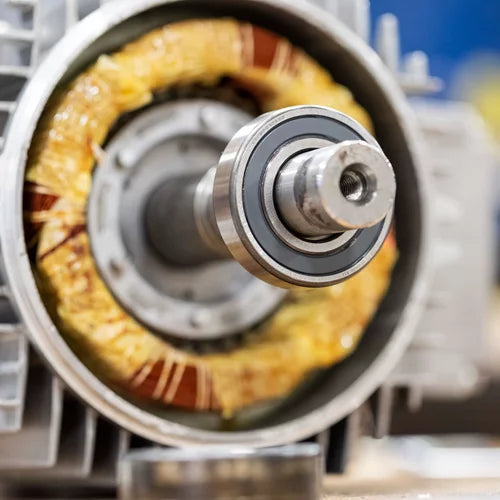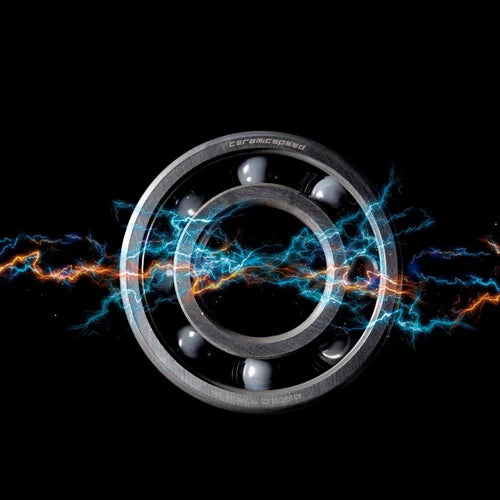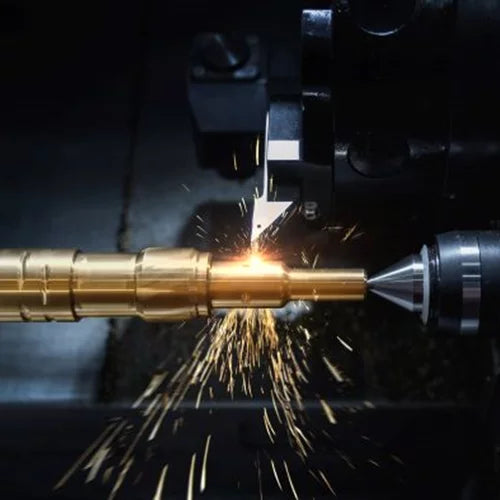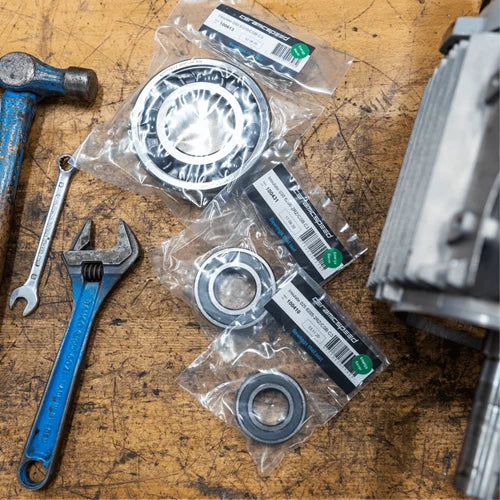High-Speed Bearings for Optimal Efficiency
In high-performance machinery, where precision and reliability are paramount, the choice of a hybrid angular contact ball bearing or hybrid ball bearing can significantly impact efficiency and bearing life. A hybrid angular contact ball bearing for high speed is essential in various demanding applications, particularly those with ceramic balls or silicon nitride (Si3N4) balls, which offer substantial advantages over a traditional steel ball bearing. These hybrid angular contact ball bearings can operate at speeds up to 50% higher than all-steel bearings while maintaining durability and efficiency. Let's explore the science behind their impressive performance and how they excel in challenging environments.
The Mechanic of a High-Speed Bearing
When a ball bearing rotate at high speeds, centrifugal forces push the balls outward toward the outer race. In all-steel bearings, the weight of the steel balls intensifies these forces, increasing the contact pressure between the balls and the raceway. This higher pressure leads to increased friction, which generates more heat, causing wear and reducing the bearing's life.
In a hybrid ball bearing, however, the use of ceramic balls or silicon nitride balls reduces these issues. Si3N4 balls are 58% lighter than steel balls, significantly lowering the centrifugal load on the raceway. This reduction in load helps minimize friction, heat generation, and wear, enabling the bearing to operate at higher speeds without sacrificing performance. This enhanced durability makes hybrid ball bearings ideal for environments where longer life and reduced maintenance are required.
Corrosion Resistance: A Crucial Feature
Hybrid ball bearings offer not only high-speed performance but also improved corrosion resistance. In industries such as food processing, where bearings are frequently exposed to wet environments or high humidity, and run at high speed corrosion can quickly degrade traditional steel bearings. Corrosion-resistant bearings are designed to withstand these harsh conditions. Many hybrid ball bearings feature stainless steel components and solid lubricants, which further enhance their resistance to corrosive elements, such as water, chemicals, and contaminants.
These bearings are particularly well-suited for environments where standard lubrication methods, like grease or oil, are insufficient to protect against contamination. In such cases, bearings with corrosion-resistant features ensure optimal performance, even when exposed to moisture, chemicals, or extreme temperatures. The materials used in these bearings are specifically chosen to meet the challenges of harsh environments, providing reliable, long-lasting solutions.
Durability in Wet and High-Humidity Environments
Bearings used in wet environments or areas with high humidity require robust designs to prevent corrosion and degradation. Hybrid ball bearings are often equipped with corrosion-resistant materials, such as stainless steel, and seals that protect the internal components from water and other contaminants. The cages of these bearings are also made from corrosion-resistant materials to ensure long-term durability and performance. These features make hybrid ball bearings ideal for applications found in industries like food processing, where the bearings are frequently exposed to moisture, cleaning chemicals, and other corrosive substances.
For applications where water or chemicals are present, corrosion-resistant bearings provide a reliable solution. The use of solid lubricants in some configurations ensures that even without regular maintenance, the bearings will continue to perform effectively. This is critical in industries where regular lubrication is difficult or where grease may not provide adequate protection.
Precision and Reduced Wear
One of the most critical challenges in high-speed applications is maintaining precision while minimizing wear. The silicon nitride balls in hybrid ball bearings offer increased durability compared to steel balls. Si3N4 has a higher elasticity factor, which means it deforms less under load. This reduced deformation decreases the contact area between the balls and the raceways, leading to less friction and heat buildup. As a result, hybrid ball bearings can operate more efficiently and with less wear, extending their operational life even in demanding applications.
In angular contact ball bearings (ACBBs), misalignment between the inner and outer rings can be problematic, especially at high speeds. The reduced weight of the Si3N4 balls helps minimize the effects of centrifugal force, allowing for more stable operation. Additionally, hybrid ball bearings are designed to handle the higher speeds and pressures encountered in modern machinery, ensuring that they can meet the performance requirements of today’s most challenging applications.
Corrosion-Resistant Bearings for Demanding Applications
In applications where bearings are exposed to harsh conditions, such as chemicals, moisture, or contaminants, corrosion-resistant bearings are essential. These bearings are designed to withstand such environments, offering long-term solutions for industries where standard steel bearings would quickly fail. For example, in the food industry, bearings are frequently exposed to water, cleaning agents, and food particles, all of which can cause corrosion and damage. Hybrid ball bearings, with their stainless steel construction and corrosion-resistant features, are ideal for such applications.
The use of solid lubricants in these bearings further enhances their ability to perform in environments where traditional grease or oil might wash away or become contaminated. This makes hybrid ball bearings a perfect fit for wet environments where consistent lubrication is difficult to maintain.
Versatility and Configurations to Meet Diverse Needs
Hybrid ball bearings come in various configurations to meet the needs of different applications. Whether you're dealing with high-speed spindles in machine tools or turbomachinery, hybrid ball bearings offer the versatility required for optimal performance. Their ability to operate at up to 50% higher speeds than traditional steel bearings means that they are well-suited for high-speed machinery, such as turbines, jet engines, and medical devices.
Additionally, hybrid ball bearings are designed with features that help them perform in environments where traditional bearings would struggle. The combination of corrosion-resistant materials, high precision, and reduced friction makes these bearings a top choice for industries that require reliable and efficient products. For example, in aerospace and automotive applications, where both speed and durability are essential, hybrid ball bearings provide the necessary performance to ensure long-term reliability.
Seals, Lubricants, and Solutions for Challenging Applications
Hybrid ball bearings are often equipped with seals to protect against the intrusion of contaminants such as dirt, moisture, and chemicals. These seals help maintain the integrity of the bearing, ensuring that it can operate smoothly even in environments where exposure to oil, water, or chemicals is a constant challenge. The grease or solid lubricants used in these bearings are carefully selected to provide maximum protection and ensure long-term durability.
In high-speed applications where a traditional bearing would wear out quickly due to heat, friction, or exposure to contaminants, a hybrid ball bearing provide a reliable solution. It is designed to meet the specific needs of high-speed applications, offering enhanced durability, corrosion resistance, and the ability to operate at much higher speeds than a standard bearing.
Conclusion: The Future of Hybrid Bearings
Hybrid bearings represent a significant advancement in bearing technology, combining the best aspects of corrosion-resistant materials, high-speed performance, and extended durability. By reducing the weight of the balls and using stainless steel and silicon nitride, these bearings offer exceptional corrosion resistance and the ability to perform in wet environments, high-humidity areas, and applications where chemicals are present.
Their ability to operate at higher speeds while resisting wear and corrosion makes hybrid bearings a go-to solution for industries ranging from aerospace and automotive to food processing and medical devices. As more demanding applications require bearings that can withstand extreme conditions, hybrid ball bearings will continue to meet and exceed those challenges, providing long-lasting, efficient solutions that ensure optimal performance.








